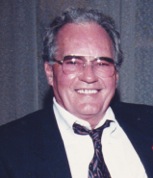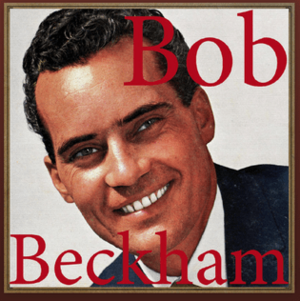Bob Beckham facts for kids
Quick facts for kids
Bob Beckham
|
|
|---|---|

Beckham c. 1997
|
|
| Background information | |
| Birth name | Robert Joseph Beckham |
| Born | July 8, 1927 Stratford, Oklahoma, U.S. |
| Died | November 11, 2013 (aged 86) Hermitage, Tennessee, U.S. |
| Genres | Country |
| Occupation(s) |
|
| Years active | 1958–1967 |
| Labels | Decca, Smash, Monument |
Robert Joseph Beckham (born July 8, 1927 – died November 11, 2013) was an American music publisher. He was based in Nashville, a famous city for music. Bob Beckham was known for helping many songwriters. He led a company called Combine Music Publishing from 1964 to 1989.
Beckham played a very important part in the careers of famous artists. These included Kris Kristofferson, Dolly Parton, Larry Gatlin, Tony Joe White, and Billy Swan. He started as an actor in Hollywood movies. Later, he became a singer for a short time. But his main career became music publishing in 1961.
In the 1970s, Beckham became a powerful person on Music Row. This is a famous area in Nashville where many music businesses are located. He helped many great songwriters create classic songs. Some of these songs are "Me and Bobby McGee" and "Sunday Morning Coming Down" by Kris Kristofferson. He also helped with Elvis Presley's hit song "Burning Love" by Dennis Linde.
Bob Beckham was a strong but caring leader for his songwriters. He truly loved helping them. He received several awards for his work. These include the Mentor Award from the Nashville Songwriters Hall of Fame. He also got the Master Award in 1988 and the Pioneer Award in 2014. Beckham passed away in 2013 at the age of 86.
Contents
Early Life and Music Beginnings
Bob Beckham was born in Stratford, Oklahoma. When he was 8 years old, he started acting in a traveling show. He even acted in Hollywood movies like Junior G Men. But in 1940, he went back to Oklahoma to finish school.
During World War II, he served in the U.S. Army as a paratrooper. This means he was trained to jump from airplanes. After the war, he worked as an electrician. Then, he got a job on the radio with Arthur Godfrey. Soon after, he signed a record deal with Decca Records.
As a singer, three of his songs became popular in 1959-1960. "Just as Much as Ever" reached No. 32 on the Billboard Hot 100 chart in 1959. "Crazy Arms" reached No. 36 in 1960. He also wrote "Danger," a song that became a hit for Vic Dana in 1963. Bob Beckham also opened shows for singer Brenda Lee.
When his singing career slowed down, he moved to Nashville in 1959. There, a music producer named Owen Bradley suggested he try music publishing. In 1961, Beckham started working for Bill Lowery. He helped artists like Ray Stevens and Jerry Reed. Later, he worked for Shelby Singleton Music.
Leading Combine Music
In the early 1960s, Fred Foster owned Monument Records and Combine Music. He asked Bob Beckham to manage Combine Music in 1964. Combine Music was the part of the company that handled songs. When Beckham joined, the company was having a tough time.
After two years, Beckham became the president of Combine Music. He was known for truly caring about songwriters. He became a supportive leader for them. When Combine Music moved to Music Row in Nashville, it became a popular spot for songwriters. They would gather there and share ideas.
Beckham also helped a new trend grow. He signed singer-songwriters. This meant he worked with artists who wrote their own songs and also performed them. This way, the company could help both the singer and their songs. Kris Kristofferson is a great example of this. Beckham also found smart ways to get songs used in commercials. This helped Combine's songs become even more famous.
Helping Dolly Parton
In 1964, Dolly Parton moved to Nashville right after high school. She wanted to get a record deal. She tried a few places, but they already had many female singers. Then she met Fred Foster, who signed her to Monument Records.
Bob Beckham signed Dolly to a publishing deal at Combine Music. Dolly had already written hundreds of songs. At first, they tried to record her as a rock singer. But Dolly said she wanted to sing country music. The rock songs were not successful.
However, two songs she wrote with her uncle became top ten hits for another singer, Bill Phillips. After this, Dolly was allowed to try country music. Her song "Dumb Blonde" became a hit. In 1967, she released her first album, "Hello, I'm Dolly." She wrote or co-wrote all the songs on it. The album reached No. 11 on the country charts.
This album got the attention of Porter Wagoner. Soon, Dolly became famous across the country by joining the "Porter Wagoner Show." With Dolly's permission, Beckham helped other artists record her songs. Dolly said he worked very hard for them.
Discovering Kris Kristofferson
In 1967, a new songwriter named Kris Kristofferson visited Bob Beckham's office. Beckham listened to his songs and immediately called Fred Foster. Beckham and Foster had a rule: every new songwriter had to sing four songs for them. They believed that if someone could write four great songs, they were a true writer.
When Kristofferson sang, both Beckham and Foster knew he was special. Foster said he had never seen a writer of such high quality. Kristofferson signed with Combine for publishing and Monument for recording. Kristofferson worried, saying, "I can't sing— I sound like a frog." But they told him, "you can communicate."
In 1969, Kristofferson was having trouble writing new songs. Foster suggested he write a song about a woman's name. A secretary named "Bobbie McKee" worked in their office. Kristofferson then wrote "Me and Bobby McGee." He sang it for her in the office.
The song became very popular. Roger Miller first recorded it in 1969. Kristofferson's own version came out in 1970 but did not become a hit. However, Janis Joplin's version, released after she passed away, became a No. 1 hit. Joplin's version changed "Bobby McGee" to a male character. Other artists also had top-ten hits with Kristofferson's songs. These included "For the Good Times" by Ray Price, "Sunday Mornin' Comin' Down" by Johnny Cash, and "Help Me Make It Through the Night" by Sammi Smith.
Working with Dennis Linde
In 1969, Dennis Linde, a 26-year-old musician and songwriter, moved to Nashville. Bob Beckham hired him as a staff writer at Combine Music. Linde loved the creative atmosphere there. He said that Bob Beckham's building was an old, two-story place. Kris Kristofferson even lived in a room upstairs next door. Linde felt he had never met so many talented people.
In 1970, Linde had a couple of hit songs. One was recorded by Roy Drusky and another by Roger Miller. Linde also met Beckham's daughter, Pam, and they later got married.
The next year, Linde wrote a song called "Burning Love." He had just bought a drum set and was learning to play when the song came to him. He played all the parts himself and made a demo recording. The first singer to record it was Arthur Alexander in late 1971. But soon, the song reached Elvis Presley.
Elvis Presley released his own version, which quickly became a huge hit. It reached the top ten in the U.S. and Europe in 1972. It was one of Presley's last major hits. The song's worldwide success greatly increased Combine Music's profits. For example, "Burning Love" was used in five movies. Linde's reputation as a songwriter also grew, allowing him to work on other projects and release his own albums. Elvis recorded two more of Linde's songs: "I Got a Feelin' in My Body" and "For the Heart."
Later Years and Retirement
Combine Music's success was highest in the early 1970s. This was mainly because of the huge hits from Kris Kristofferson and Dennis Linde. These songs became well-known country music classics.
In 1986, Combine Music was sold to a company called SBK Entertainment. In 1990, Bob Beckham started a new company called HoriPro Music. This was a part of Taiyo Music, Japan's largest music publisher. He became the chairman of "HoriPro Entertainment Group" in 2001. He stayed as president until he retired in 2006.
Discography
Albums
| Title | Details |
|---|---|
| Just as Much as Ever |
|
Singles
| Year | Single | Peak chart positions |
Album | |
|---|---|---|---|---|
| US Country | US | |||
| 1958 | "Tomorrow" | — | — | Non-album song |
| 1959 | "Just as Much as Ever" | — | 32 | Just as Much as Ever |
| "Crazy Arms" | — | 36 | ||
| 1960 | "Mais Oui" | — | 105 | Non-album songs |
| "Nothing Is Forever" | — | — | ||
| "Meet Me Halfway" | — | — | ||
| 1961 | "Forget It" | — | — | |
| "How Soon" | — | — | ||
| "Just Friends" | — | — | ||
| 1962 | "I Cry Like a Baby" | — | — | |
| "Building Memories" | — | — | ||
| 1963 | "Footprints" | — | — | |
| "Grabbing at Rainbows" | — | — | ||
| 1964 | "Helpless" | — | — | |
| 1965 | "Slowly Dying" | — | — | |
| 1967 | "Cherokee Strip" | 73 | — | |
| "Lily White" | — | — | ||
| "—" denotes releases that did not chart | ||||
 | Shirley Ann Jackson |
 | Garett Morgan |
 | J. Ernest Wilkins Jr. |
 | Elijah McCoy |


